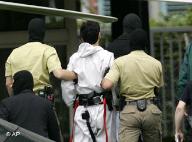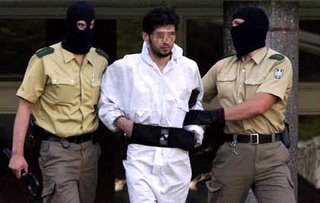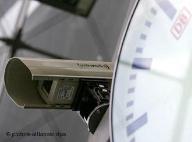Terror Suspect Fled Germany for Middle East, Officials Say
German officials continue to search offices and apartments while questioning witnesses and "contacts" in an effort to catch the second man suspected of being part of a bomb plot in late July.
German investigators have expanded their investigation into the plot to bomb two regional trains to five cities, searching apartments and offices in northwestern Germany and interviewing dozens of people including an alleged "contact" of the two suspects, German media reported.
According to the Süddeutsche Zeitung newspaper, police on Tuesday searched the Cologne apartment of a man they believe was an accomplice of the suspect, Youssef Mohamad E. H., a 21-year-old Lebanese student who was arrested in Kiel on Saturday. The accomplice is allegedly Jihad Hamad, a 20-year-old Lebanese, who is still at large.
 Officials searched a Lebanese car dealer in Essen, another business in Oberhausen and a grocery store in Gelsenkirchen. They also questioned a man thought to be a contact person for the suspects and searched his Kiel apartment.
Officials searched a Lebanese car dealer in Essen, another business in Oberhausen and a grocery store in Gelsenkirchen. They also questioned a man thought to be a contact person for the suspects and searched his Kiel apartment.At the same time, new details emerged about the movements of the two suspects immediately after they planted two bombs in suitcases on trains in Cologne bound for Dortmund and Koblenz on July 31.
That night, the two reportedly flew to Istanbul, according to Süddeutsche Zeitung. Hamad supposedly continued on to the Middle East. But Youssef Mohamad E. H. returned to Germany. Why he did so remained unclear.
New details emerge
With the help of Lebanese intelligence, which picked up a call Youssef Mohamad E. H. made to his family in Lebanon after seeing his image broadcast on German television, police were able to catch him. Surveillance cameras from the Cologne train station had captured the two men on film.
German Prosecutor General Monika Harms said Tuesday police had discovered the identity of the second man, Hamad, three weeks ago but failed to locate him. The head of the Federal Crime Office, Jörg Ziercke, had said late Monday that he was confident the second bomb suspect would be captured, adding that police had garnered "a wealth of information" from Youssef Mohammed E.H.
Youssef Mohamad E. H. has lived in Germany since 2003. His alleged accomplice, investigators say, has been in Germany twice and had lived in the country since February.
Berlin daily Der Tagesspiegel reported that some of Youssef Mohammed E. H.'s relatives had links to the banned Islamic extremist group Hizb ut-Tahrir and that the 21-year-old was believed to have been radicalized by the organization, which strives to create an Islamic state. Investigators believe that the two may have made contact through that organization. The anti-Israeli organization has been banned in Germany since 2003.
Hamburg Islamic organization under scrutiny
The online version of newsweekly Der Spiegel said that the Office for the Protection of the Constitution, the domestic intelligence service, was following a lead to a mosque in the northern city of Hamburg because Youssef Mohammed E.H. had a poster of the institution hanging in his dormitory in Kiel.
The Imam Ali Mosque is believed to be a meeting point for supporters of the Lebanese Shiite Muslim militia Hezbollah.
A spokesman for the mosque denied any contact with Youssef Mohammed E.H. "We do not know this person at all," he told AFP.
Der Spiegel said that investigators did not see a direct link between the bombing plot and the mosque but hoped to learn more about the suspects by probing its activities.
DW staff (jb)
Deutsche Welle 08/2006



